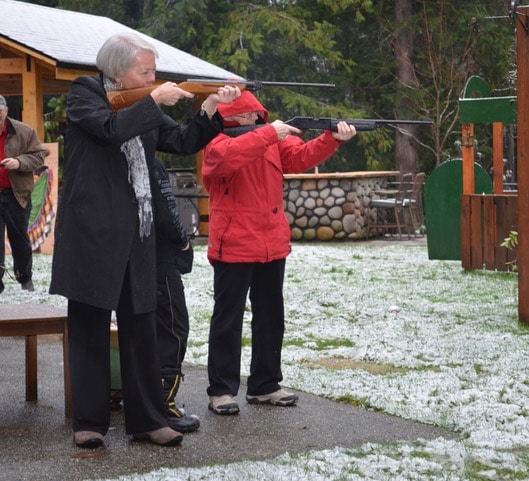
As Bob Dylan sang to us in 1964, The Times They Are A Changing. Historians say Bob wrote the song in October of 1963 and so it seems appropriate that this month we want to revisit the message again, nearly 55 years later.
The picture above is Ryan’s mother and my mother doing a little pellet gun practice with our kids. I realize it isn’t the normal image one might advise I use in today’s climate of gun reform or gun violence but, I assure you, they are peaceful and non-violent Grandmothers.
I use this picture because it tells a story of time and perspective. If this picture were taken six or seven decades earlier, these ladies wouldn’t be holding pellet guns. Ryan’s mother was raised in Texas and my mother was raised in Montana. Like all people, they are a product of their environment. What is perceived as normal is based on what you experience all around you. Ryan was raised in Alaska, where everyone had a gun rack on their truck (usually with a gun in it) parked at school. When he lived in Fairbanks, everyone entered the schools and the banks with their guns strapped on. In Texas, Montana, and Alaska, guns were used for protection—necessary protection for the survival of you and your animals.
When Ryan came to the lower 48, he noticed something different. Guns were carried for more than protection. There was some status to having a gun and being able to talk about your gun. For our mothers and for Ryan, you never talk about a gun, you use a gun. If a bear is coming at you, there isn’t a lot of gun waving and and threatening, “I’m going to put a cap in you, bear.” You just fire off a round and hope the bear gets the message that she should retreat.
Ryan and I both grew up knowing that a gun wasn’t a way to solve a problem (other than a bear coming at you). In our upbringing, guns really weren’t associated with fighting. That didn’t mean we weren’t taught about fighting. Knowing when to fight and how to fight was just as valuable as knowing how to participate in family chores, take care of your pets, or do well in school. It was a life skill. I don’t recall who taught me how to hold my fist, but I very clearly recall understanding that I would break my thumb if I did it the wrong way. Built into the lesson plans was also an overall understanding of “don’t write checks that your body can’t cash.” Basically, don’t run your mouth in the wrong place or to the wrong people. We also learned that you don’t start the fight but, in defense, you better end the fight.
I realize there are people who only believe in “turning the other cheek” and might take offense to our early lessons—but I think they were valuable. We learned time and place or the context for when defending yourself is appropriate. I have no problem admitting that I’ve thrown a punch. I didn’t start the fight but, when someone hit my cousin, I think my response was completely appropriate. I grew up hearing stories about how my Uncle Ray, who was developmentally disabled, was teased by some boys on the school bus. I don’t recall if it was my Uncle Bob or Uncle Bud who had a little “Billings-style boxing match” after they got off the school bus, but the teasing stopped. In that way, kids learned not to run their mouth or write checks their body couldn’t cash. For me, the guy who hit my cousin learned fairly that he didn’t have the funds to cash that check.
When Ryan came down from Alaska to visit a friend heading out on deployment, he had his first interaction with “weapon” fighting. He and his friends were strolling through an area with fraternities when a group of about 20 young men came out of their frat to fight. One of the college kids threatened to cut them with a knife. Ryan kind of laughed at that because it sounded so ridiculous. I will spare you the details (although some of it is quite funny) but, word to the frat world, boys should not fight men—especially Alaskan men who lift weights 3 hours a day and one is the heavy weight boxing champ of Alaska. Don’t worry, there was no blood shed—just some bruised egos.
The point of these stories is that it is quite obvious we grew up in different times. If you threatened someone, insulted them for their sexuality or race, or made derogatory comments about their family, no one felt sorry for you when the insulted person cleaned your clock. No one called the cops or the prosecutor. But, times are changing. Instead of learning that you shouldn’t run your mouth, many people run their mouth and then waive around a weapon. They start fights but try to look like a victim when law enforcement arrives.
Why would we highlight this strange change in times? Well, because, more and more, the people who actually start the fight tend to win. By win, we mean they are not the ones who end up being arrested. They love to run their mouth off in a bar, insult your girlfriend, and call you gay. You might ask to “take it outside” to teach them a lesson but they head out to their car to pull out a gun. These people who use “fighting words” don’t actually fight and, when they do, they usually get their @#% kicked. So, when law enforcement arrives, you get arrested. If you never hit them, they will still tell law enforcement that you followed them outside and they felt threatened. The times are changing—and they play by different rules.
So, while many of us could understand that “taking it outside” might seem reasonable, that response no longer works the way it did decades ago. You have to back down. You have to take the insults. You have to walk away. The real reason you must retreat is that the check your body has to cash is way too expensive today.
Today, law enforcement is called for every altercation. There is very little “down time” and, when they respond, situations often escalate rather than deescalate. They don’t have time (or perhaps desire) to find out who started the fight and why. Usually, the most sympathetic (sometimes just pathetic) person is deemed the “victim.” The other person is arrested. Additionally, depending on the county or city you were arrested, certain prosecutors don’t care whether the person baited you into a fight. It doesn’t matter that they called you a racially derogatory term. If you choose to fight, you have to accept that your actions will likely amount to a criminal charge. Law enforcement doesn’t hold trial at the bar or the sports field. They simply arrest you, file a report, and you go to jail.
Getting arrested is just the start of the “costs” of fighting. To hire a defense attorney who can present your side of the story to the prosecutor, it will cost you anywhere from $2500 to $10,000—and there are no guarantees. Criminal charges are a lot like math equations. If the prosecutor can make the three or four elements of a criminal statute add up, you get convicted. If you don’t want to test your luck at trial (and face a much longer sentence), you might feel forced to plea to a lesser charge. Additionally, the process lasts a long time. While you’re trying to move on and apply for a new job, your case may linger for months or even a year. In that time, no one can answer whether you will lose your job, spend months or years in jail, and be forced to say goodbye to your family.
Hopefully, if you’re like us, as we have grown older we rarely encounter situations where a fight could happen. Unless someone grabs the last Costco pumpkin pie during Thanksgiving week, I’m probably not “taking it outside” anytime soon. However, when it happens to those of us from another era, it’s important to know what our response has to be. We need to check our egos and decide whether the fight is truly necessary. While someone should get their ass kicked, you probably don’t want to be the one paying the price for it. While it’s hard to walk away, remember that a pathetic name-calling jerk is not worth your freedom or hard-earned money.
Sometimes it’s hard to react differently when your instincts say something else. So, have a game plan. We take the calls after the fact and see the mess it creates. We don’t want more of these calls. In our minds, there is an element of unfairness to criminal charges for certain fights—but, despite this, we must learn to change with the changing times. In the words of Bob Dylan, “You better start swimmin’ or you’ll sink like a stone. For the times they are a-changin’.”

Get help now
Whether you choose to handle your case alone or engage the Witt Law Group, being informed and prepared is essential. Early involvement of an attorney can significantly impact your chances of a fair recovery, allowing you to focus on healing while we handle negotiations with insurance adjusters to secure fair compensation for your injuries.




